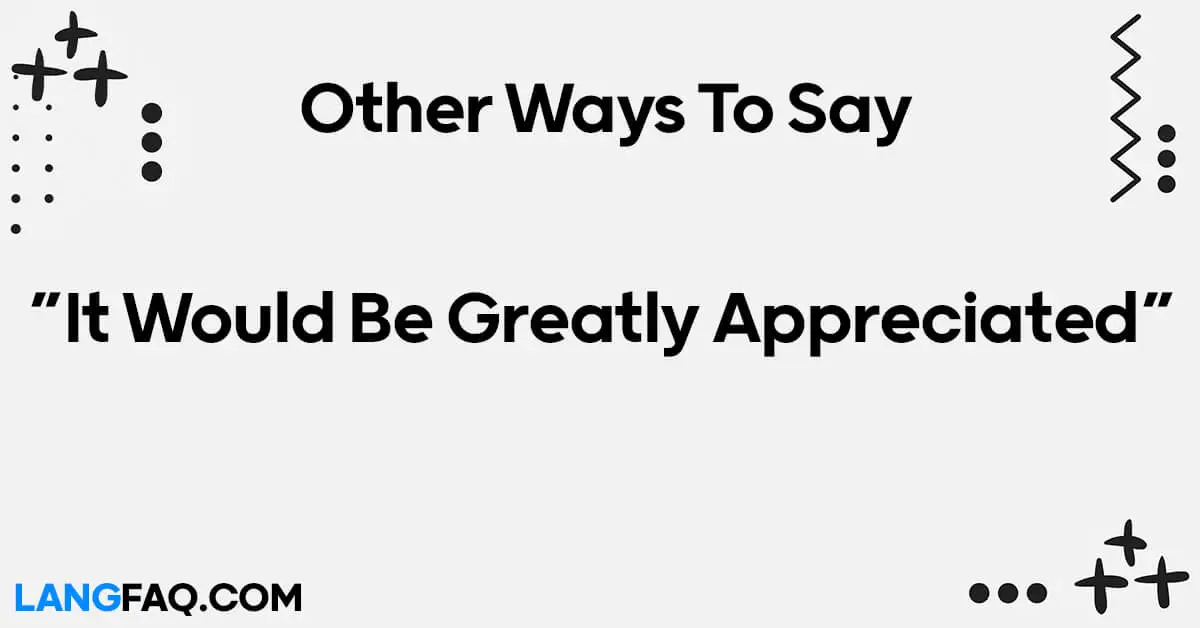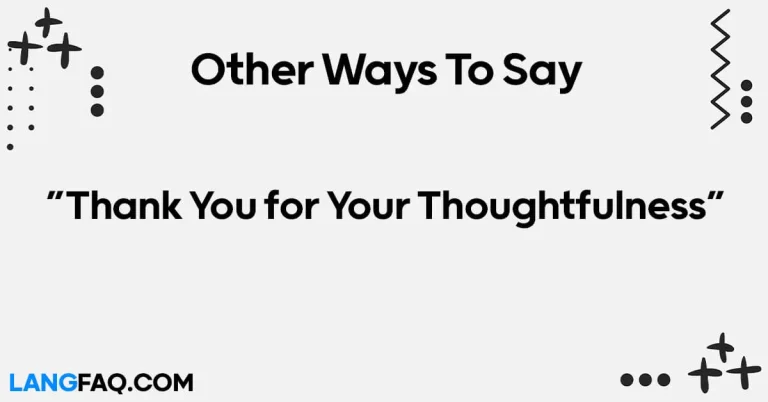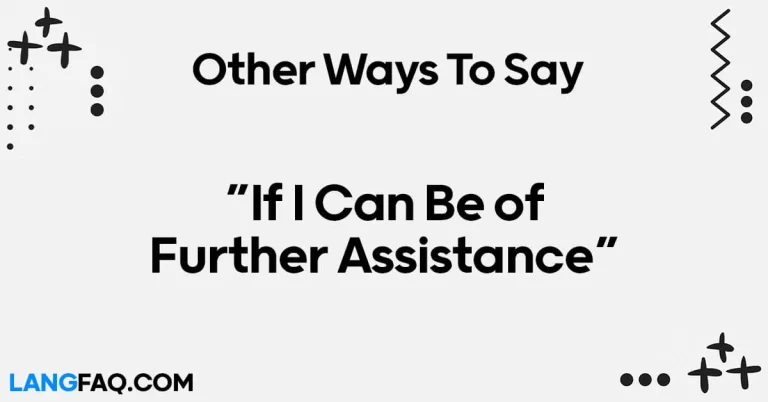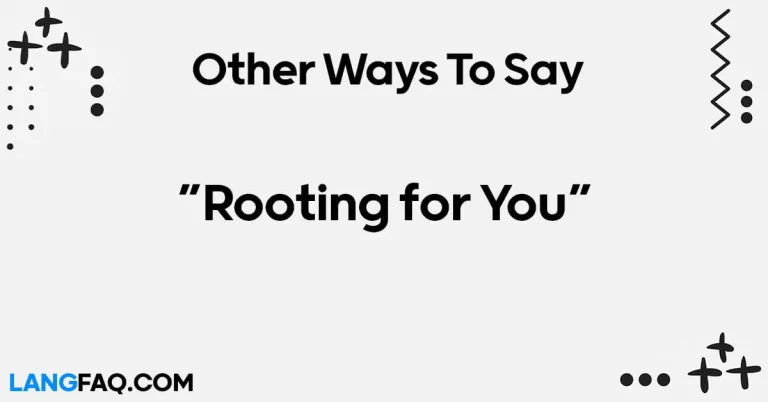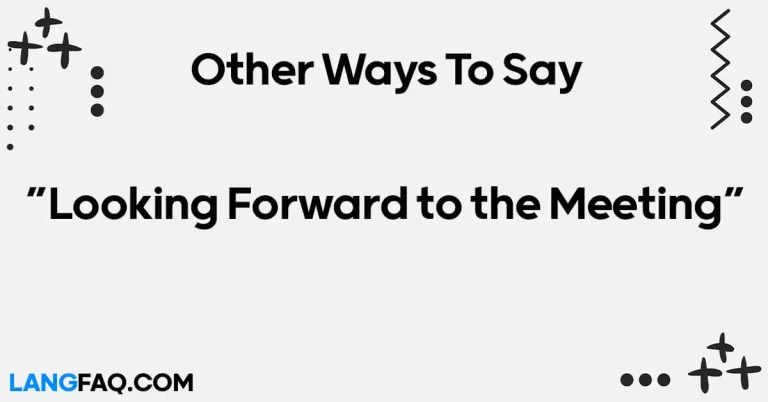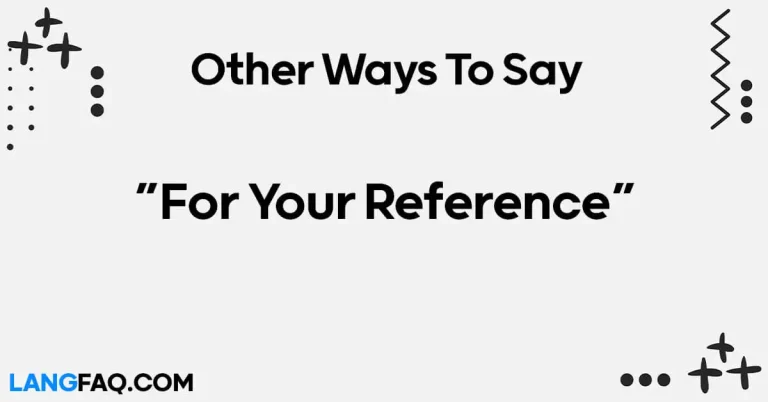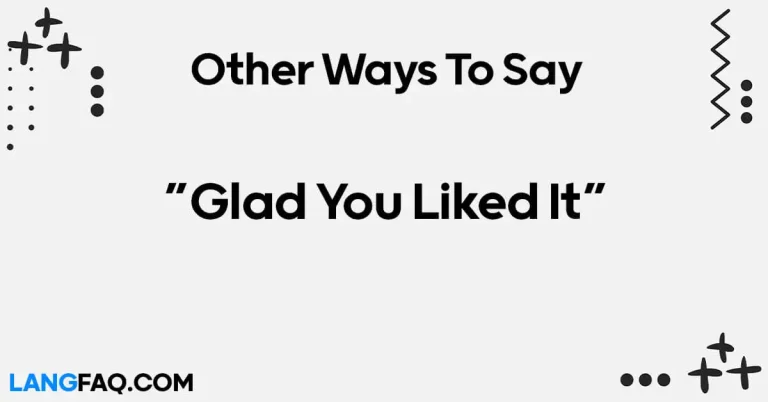Expressing gratitude goes beyond the conventional “It Would Be Greatly Appreciated.” In this article, we’ll delve into various ways to convey appreciation, enriching your communication toolkit. Whether in professional settings, personal relationships, or written communication, discover unique expressions that add depth to your thankfulness.
12 Other Ways to Say “It Would Be Greatly Appreciated”
Here are 12 other ways to say “It Would Be Greatly Appreciated”:
- It would mean a lot.
- Your help is highly valued.
- I would be profoundly grateful.
- Your assistance is indispensable.
- I’m sincerely thankful for your support.
- Your cooperation is greatly appreciated.
- I can’t thank you enough.
- Your efforts haven’t gone unnoticed.
- I’m indebted for your contribution.
- Thanks a bunch!
- You’re a lifesaver.
- I’m eternally grateful for your help.
Here’s a table with meanings and examples for the 12 other ways to say “It Would Be Greatly Appreciated”:
| Expression | Meaning | Example |
|---|---|---|
| It would mean a lot. | Signifies high importance or significance. | Your guidance on this matter would mean a lot to me. |
| Your help is highly valued. | Emphasizes the significance of assistance. | I want you to know that your help is highly valued. |
| I would be profoundly grateful. | Expresses deep gratitude. | If you could assist me, I would be profoundly grateful. |
| Your assistance is indispensable. | Indicates that the help is crucial. | Your assistance in this project is indispensable. |
| I’m sincerely thankful for your support. | Conveys genuine thanks. | I’m sincerely thankful for your support in this matter. |
| Your cooperation is greatly appreciated. | Highlights collaboration. | Your cooperation in this endeavor is greatly appreciated. |
| I can’t thank you enough. | Indicates overwhelming gratitude. | I can’t thank you enough for your generous help. |
| Your efforts haven’t gone unnoticed. | Acknowledges someone’s efforts. | I want you to know that your efforts haven’t gone unnoticed. |
| I’m indebted for your contribution. | Implies a sense of indebtedness. | I’m deeply indebted for your significant contribution. |
| Thanks a bunch! | Casual and friendly way of saying thanks. | Thanks a bunch for your help with this task. |
| You’re a lifesaver. | Expresses gratitude for a rescue or help. | You’re a lifesaver; I couldn’t have done it without you. |
| I’m eternally grateful for your help. | Conveys everlasting gratitude. | I’m eternally grateful for your help throughout. |
In various situations, there are myriad ways to express gratitude beyond the conventional “It Would Be Greatly Appreciated.” These alternative phrases not only add richness to communication but also convey the depth of appreciation in different contexts. Choose the expression that best suits the sentiment you want to convey and enhance the impact of your gratitude.
Is It Correct to Say “It Would Be Greatly Appreciated”?
Certainly! “It would be greatly appreciated” is a correct and polite expression commonly used to convey gratitude or to make a request. This phrase is often employed in various contexts, both formal and informal, to express thanks or to politely ask for assistance.
Usage Scenarios:
- Making a Request:
- Example: “If you could review the proposal before the meeting, it would be greatly appreciated.”
- Expressing Gratitude:
- Example: “Your timely support during the project was invaluable, and it would be greatly appreciated if you could continue your assistance.”
- Formal Correspondence:
- Example: “Please find the attached documents for your review. Your feedback on this matter would be greatly appreciated.”
- Seeking Assistance:
- Example: “I’m facing some challenges in understanding the new software. Your guidance on this issue would be greatly appreciated.”
Variations:
- “Your help would be greatly appreciated.”
- “It would be highly appreciated.”
- “Any support you can provide would be greatly appreciated.”
Dictionary Insights: The phrase “greatly appreciated” implies a high level of acknowledgment and gratitude. According to the Cambridge Dictionary, “appreciated” means to recognize the quality or significance of something, and when coupled with “greatly,” it intensifies the depth of acknowledgment.
Pros:
- Politeness: It is a courteous and formal way to convey appreciation or make a request.
- Versatility: Suitable for various contexts, including professional emails, requests, or expressing thanks.
Cons:
- Formality: In extremely casual settings, it might come off as overly formal.
Grammar/Usage Tips:
- Use this phrase in situations where you genuinely value the assistance or when making a polite request.
- Combine it with specific details to add clarity and context to your expression.
Professional Mail Example With “It Would Be Greatly Appreciated”
Here’s an example of a professional email using the phrase “It would be greatly appreciated”:
Subject: Request for Your Assistance in Project Review
Dear [Recipient’s Name],
I trust this message finds you well. I am reaching out to request your valuable assistance in reviewing the upcoming project proposal. Your expertise and insights in project evaluation have always been exemplary, and your feedback would be instrumental in ensuring the success of this initiative.
If you could spare some time to go through the attached proposal and share your thoughts by [deadline], it would be greatly appreciated. Your attention to detail and strategic input have consistently contributed to the enhancement of our projects, and we believe your perspective will significantly enrich this one as well.
Here are the key areas we would particularly like your insights on:
- [Specific Area of Concern]
- [Another Specific Area]
Your thorough review will undoubtedly help us address any potential challenges and refine the proposal before the final presentation.
Please find attached the project proposal document. Should you have any questions or require further information, feel free to reach out.
Thank you in advance for considering our request. Your support is crucial to the success of this project, and it would be greatly appreciated.
We look forward to your positive response.
Best regards,
[Your Full Name] [Your Position] [Your Company] [Contact Information]
1. “It Would Mean a Lot”
Expressing gratitude is an art, and saying “It would mean a lot” adds a touch of sincerity to your appreciation. This phrase signifies that the assistance you seek is of significant importance to you.
When to Use:
- Formal Context: In professional emails seeking support or cooperation.
- Informal Context: When seeking help from friends or family.
Example: “Your feedback on the proposal would mean a lot to me as we strive for excellence in our projects.”
Email Sample:
Subject: Seeking Your Valuable Input
Dear [Recipient],
I hope this message finds you well. I’m currently working on a proposal, and your expertise in this matter would mean a lot to me. Could you please spare a few moments to review it and share your insights? Your input is highly valued.
Thank you in advance for your time and consideration.
Best regards, [Your Name]*
Variations:
- It would mean the world to me.
- Your opinion means a great deal.
2. “Your Help is Highly Valued”
When you want to emphasize the significance of assistance, “Your help is highly valued” comes into play. It conveys a sense of appreciation for the contribution made.
When to Use:
- Formal Context: Acknowledging professional support or collaboration.
- Informal Context: Expressing gratitude for personal assistance.
Example: “Thank you for your thorough review of the report; your help is highly valued in ensuring accuracy and completeness.”
Email Sample:
Subject: Grateful for Your Support
Dear [Recipient],
I wanted to express my sincere gratitude for your recent assistance. Your help is highly valued, and I truly appreciate your dedication to our shared goals. Thank you for being an integral part of the team.
Best regards, [Your Name]*
Variations:
- Your assistance is greatly appreciated.
- I can’t thank you enough for your valuable help.
3. “I Would Be Profoundly Grateful”
For situations where you want to express deep gratitude, “I would be profoundly grateful” adds a touch of earnestness to your appreciation.
When to Use:
- Formal Context: Requesting a favor that holds significant importance.
- Informal Context: Conveying heartfelt thanks in personal relationships.
Example: “If you could spare some time to mentor me in this project, I would be profoundly grateful for your guidance.”
Email Sample:
Subject: Seeking Your Mentorship
Dear [Recipient],
I hope this message finds you well. I’m embarking on a new project and believe your expertise would be invaluable. I would be profoundly grateful if you could spare some time to mentor me through this endeavor.
Thank you for considering my request.
Warm regards, [Your Name]*
Variations:
- I would be deeply appreciative.
- Your support would mean a great deal to me.
4. “Your Assistance is Indispensable”
When the help you seek is crucial and indispensable, “Your assistance is indispensable” communicates the vital nature of the support needed.
When to Use:
- Formal Context: Seeking crucial support in professional settings.
- Informal Context: Acknowledging the critical role of assistance in personal matters.
Example: “In our upcoming project, your expertise is indispensable, and I believe your guidance will be key to its success.”
Email Sample:
Subject: Request for Your Invaluable Assistance
Dear [Recipient],
I hope this message finds you well. As we embark on a challenging project, I believe your assistance is indispensable for its success. Your expertise would make a significant difference, and I am confident in the value you bring to the team.
Looking forward to your positive response.
Best regards, [Your Name]*
Variations:
- Your support is essential.
- I can’t proceed without your indispensable guidance.
5. “I’m Sincerely Thankful for Your Support”
To convey genuine thanks, “I’m sincerely thankful for your support” adds a personal touch, expressing a deep appreciation for the assistance received.
When to Use:
- Formal Context: Concluding a professional interaction with gratitude.
- Informal Context: Showing heartfelt thanks for personal support.
Example: “Your guidance throughout the project has been invaluable, and I’m sincerely thankful for your support in achieving our goals.”
Email Sample:
Subject: Heartfelt Thanks for Your Support
Dear [Recipient],
I wanted to take a moment to express my heartfelt thanks for your continuous support throughout the project. Your guidance has been instrumental, and I’m sincerely thankful for your contribution to our success.
Warm regards, [Your Name]*
Variations:
- I truly appreciate your support.
- Thank you from the bottom of my heart for your assistance.
6. “Your Cooperation is Greatly Appreciated”
In scenarios where collaboration is key, “Your cooperation is greatly appreciated” acknowledges the importance of working together harmoniously.
When to Use:
- Formal Context: Recognizing cooperative efforts in a professional environment.
- Informal Context: Appreciating teamwork in personal projects.
Example: “In our joint venture, your cooperation is greatly appreciated, and I believe our combined efforts will lead to success.”
Email Sample:
Subject: Appreciation for Your Cooperation
Dear [Recipient],
I wanted to express my gratitude for your cooperation in our recent project. Your willingness to collaborate is greatly appreciated, and I look forward to achieving more milestones together.
Best regards, [Your Name]*
Variations:
- I’m thankful for your collaboration.
- Your teamwork is highly valued.
7. “I Can’t Thank You Enough”
When ordinary thanks fall short, “I can’t thank you enough” conveys overwhelming gratitude, emphasizing the magnitude of appreciation.
When to Use:
- Formal Context: Expressing deep thanks in professional relationships.
- Informal Context: Conveying profound gratitude in personal situations.
Example: “Your mentorship has been invaluable, and I can’t thank you enough for the impact it has had on my professional growth.”
Email Sample:
Subject: Profound Gratitude for Your Mentorship
Dear [Recipient],
I hope this message finds you well. I wanted to express my profound gratitude for your mentorship. The guidance you’ve provided is invaluable, and I truly can’t thank you enough for the positive influence it has had on my career.
Warm regards, [Your Name]*
Variations:
- I’m endlessly grateful for your support.
- There are no words to express my thanks adequately.
8. “Your Efforts Haven’t Gone Unnoticed”
For situations where acknowledgment is overdue, “Your efforts haven’t gone unnoticed” appreciates the dedication and hard work put into a task.
When to Use:
- Formal Context: Recognizing and appreciating a colleague’s diligent efforts.
- Informal Context: Acknowledging someone’s commitment in a personal project.
Example: “Your dedication to this project is commendable, and I want you to know that your efforts haven’t gone unnoticed.”
Email Sample:
Subject: Recognition for Your Dedication
Dear [Recipient],
I hope this email finds you well. I wanted to take a moment to acknowledge your dedication to the recent project. Your efforts haven’t gone unnoticed, and I truly appreciate the hard work you’ve put in.
Best regards, [Your Name]*
Variations:
- I’ve been observing your hard work.
- Your commitment hasn’t gone unnoticed by the team.
9. “I’m Indebted for Your Contribution”
When the contribution made is significant, “I’m indebted for your contribution” expresses a sense of owing gratitude for the substantial help received.
When to Use:
- Formal Context: Conveying profound thanks for a substantial contribution.
- Informal Context: Acknowledging a friend’s or family member’s impactful help.
Example: “Your contribution to the project is beyond measure, and I’m indebted for the expertise and insights you’ve shared.”
Email Sample:
Subject: Deep Gratitude for Your Contribution
Dear [Recipient],
I wanted to express my deep gratitude for your significant contribution to the project. Your expertise has made a considerable impact, and I am truly indebted for your valuable insights.
Warm regards, [Your Name]*
Variations:
- I owe you a debt of gratitude.
- Your contribution is immeasurable, and I’m truly thankful.
10. “Thanks a Bunch!”
Injecting informality and warmth, “Thanks a bunch!” is a friendly way to express gratitude in both professional and personal settings.
When to Use:
- Formal Context: Adding a friendly tone to professional emails.
- Informal Context: Expressing casual thanks in personal relationships.
Example: “Thanks a bunch for your swift response; your assistance has been incredibly helpful in resolving this issue.”
Email Sample:
Subject: Quick Thanks for Your Help
Hey [Recipient],
Just wanted to say thanks a bunch for your quick response and help with the recent issue. Your assistance is greatly appreciated!
Best, [Your Name]*
Variations:
- Thanks a million!
- Thanks a lot for your help!
11. “You’re a Lifesaver”
When someone’s help feels like a rescue, “You’re a lifesaver” adds a touch of drama to express profound gratitude for timely assistance.
When to Use:
- Formal Context: Conveying deep thanks for crucial professional support.
- Informal Context: Playfully expressing gratitude in personal situations.
Example: “Your quick response to the crisis was a lifesaver; I don’t know what we would have done without your expertise.”
Email Sample:
Subject: Gratitude for Your Timely Assistance
Dear [Recipient],
I wanted to express my sincere thanks for your timely assistance in resolving the recent crisis. Your quick response was a lifesaver, and I’m truly grateful for your support.
Warm regards, [Your Name]*
Variations:
- You’re a hero!
- Thanks for being my lifesaver!
12. “I’m Eternally Grateful for Your Help”
For situations where thanks seem to fall short, “I’m eternally grateful for your help” expresses everlasting appreciation.
When to Use:
- Formal Context: Conveying deep thanks in significant professional matters.
- Informal Context: Expressing profound gratitude in personal relationships.
Example: “Your guidance through the challenges we faced was invaluable, and I’m eternally grateful for your help in navigating them successfully.”
Email Sample:
Subject: Endless Gratitude for Your Support
Dear [Recipient],
I hope this message finds you well. I wanted to express my endless gratitude for your unwavering support during the challenging times we faced. I’m eternally grateful for your help.
Warm regards, [Your Name]*
Variations:
- My gratitude knows no bounds.
- I’ll be forever thankful for your assistance.
FAQs
- How can I show appreciation without words? Express gratitude through actions, such as small gestures, deeds, or thoughtful gifts.
- Are there cultural differences in expressing thanks? Yes, cultures vary in their approaches; be mindful of cultural nuances in your expressions.
- Can I use informal expressions in professional emails? While a degree of formality is expected, a touch of informality can humanize your communication.
- Is it necessary to express gratitude in writing? While not mandatory, written expressions of thanks leave a lasting impression and can be impactful.
- How do I express appreciation in a diverse workplace? Use inclusive language and be aware of various cultural norms to express gratitude effectively.
- What’s the importance of non-verbal appreciation? Non-verbal gestures add depth to your gratitude, showing sincerity and thoughtfulness.
Conclusion
Embrace the richness of language to express gratitude beyond the ordinary. From formal to casual, spoken to written, let your appreciation resonate in various facets of life. Elevate your communication, strengthen relationships, and foster a culture of gratitude. Remember, there are always “12 Other Ways to Say “It Would Be Greatly Appreciated””—find the ones that resonate with you.

